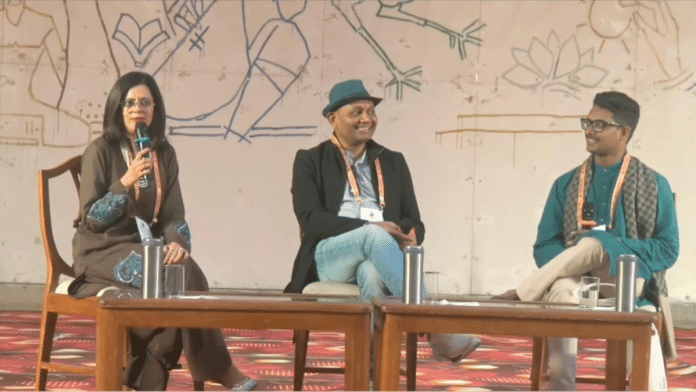Hisar: India is a country of staggering diversity, yet it is a single nation-state that more than a billion across cultures, languages, histories and allegiances call home. What holds such a vast and varied people together? What does the ‘fabric of India’ really mean?
This was the central question explored during a special session on the second day (Saturday) of the Jindal Literature Festival in Haryana’s Hisar, as panelists delved into the complexities of India’s diverse and ever-evolving identity.
The moderator of the session, author and journalist Jyotsana Mohan, began by asking the panelists, “What does the fabric of India really mean?”
Historian Anirudh Kanisetti brought up the idea of the Indian subcontinent as a land without borders, a region where cultures, ideas, people could move in free circulation.
“It is especially tragic to me,” he said, “to look at the tragedies of the 20th century when this European drug called ‘ethnonationalism’ was picked up across the Indian Ocean which essentially tore apart what used to be a world of great cosmopolitanism, and taught to reduce all of these layered tapestries of our identities to simple black and white conceptions of ‘this is us and they are them’.”
Diplomat and author Abhay Kumar said while the world had naturally been borderless before the concept of the nationstate came into being, it was not trouble-free.
But India had had the philosophy of Vasudhaiv Kutumbhkam (the world is one), a concept unique to its lands, to be found nowhere in the rest of the world except maybe in the African philosophy of ubuntu, he said.
From the idea of India that had been, the conversation moved to what it seems to be becoming.
“The boundaries that start to come up, if we speak about that, in our understanding, would it mean that identity then begins to shrink within the certain spheres of those boundaries that we’re living in?” asked Mohan.
Bringing into comparison the way we think of identity today and the way it was looked at centuries back, Kanisetti expounded on how there is a tendency across the subcontinent to look at the people of the past as less complex in ideas than the people today.
“I just find that to be profoundly reductive because just as we are multiple things to multiple people, just as we have this inherent ability to inhabit multiple identities, so did the people of the past, and I think it’s profoundly reductive to try and, its almost violent in a sense to try and force them into these very modern and simplistic identitifiers,” he said.
“You read any religious or philosophical or even courtly text written a thousand years ago and you’re constantly taken aback by just the depth and the breadth of medieval minds,” remarked Kanisetti.
Kumar delved on how history is often viewed through the lens of the present and how the past is actually seen as an interpretation of the present. This brought the conversation to how medieval India is assumed to be primitive.
Kumar also talked about the Bada Mangal festival in Lukhnow that was started by the Nawabs. “There are several examples of this coexistence and appreciating each other. I think this is really the true fabric of India.”
Further, citing the example of Kalidasa as a poet of great ecological sensitivity, he underlined how what is called ancient India was perhaps more modern than the present India. There was consensus among the panel when Kumar remarked that “for modernity we have to paradoxically go to medieval India”.
Coming back to the ‘fabric of India’, the moderator asked the panel what they thought was missing from it in today’s day, how it should be moulded.
Kanisetti said empathy is the one thing that moulds the fabric of India, or what should mould it. The ‘fabric’ needed to be moulded by decisions taken in “favour of our grandchildren rather than for the next election”.
Lamenting the loss of a strong moral core in the country, he asked, “We are one sixth of humanity, how can we not have a morality beyond what works for elections?”
The session agreed that there is much work to be done to keep the fabric of India intact. “The achievements and glory of the country should not be forgotten, but heed must be paid to the direction we are going,” Kumar concluded.
(Edited by Ajeet Tiwari)
ThePrint is the official media partner for the Jindal Literature Festival.
Also Read: Of Raags, jugalbandi & banter. A musical soiree with Pandit Vishwa Mohan Bhatt at Jindal Lit Fest






